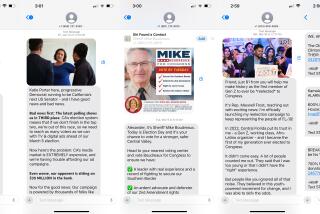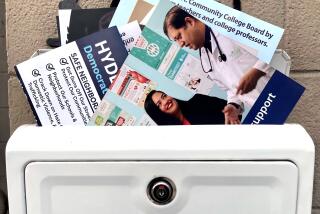Want Your Opinion to Count in Halls of Congress? Mail a Letter
- Share via
WASHINGTON — After President Clinton promoted his economic plan on national television Aug. 3, Senate Minority Leader Bob Dole (R-Kan.) ended his rebuttal by employing the latest fad in political gamesmanship.
He gazed into the camera, adopting the plaintive look of Jerry Lewis on Labor Day, and pleaded with the American people to “immediately contact your senators and representatives by calling 202-224-3121. That’s area code 202-224-3121.”
If only he’d known about a recent study conducted by Western Union, he might have asked people to write letters instead.
Over the last decade, as electronic communication has become simpler, faster and immensely popular, members of Congress have struggled not only to accommodate the volume of opinions but also to interpret the significance of its forms. For instance, if someone telephones instead of sending a telegram, does that signal more concern or less about the issue at hand? Is a constituent who sends a fax more sincere than one who uses the mail?
Now it seems the weary troop of congressional aides who handle mail for lawmakers have an answer: The electronic revolution be damned. All this instant access is too easy, too transitory, too open to manipulation, they say.
Their solution? If you want your opinion to have impact, do what Samuel F.B. Morse--perhaps the granddaddy of the communication revolution--did in 1842 when he asked Congress for money to erect the nation’s first intercity telegraph line. Mail a letter.
In a May survey, 79 congressional staffers were asked which forms of communication are most likely to catch their office’s attention.
Eighty percent preferred written messages, and just as many said letters are deemed “of great importance.” Phone calls and postcards are simply tallied and forgotten in most cases, the report said, while personal letters (form letters don’t count) are set aside for response and sometimes even forwarded to the boss.
“A letter is evidence that a constituent took the time to gather his or her thoughts and show a clear interest,” one surveyed staffer said.
Phone calls, on the other hand, are often viewed as an annoyance. “We get so many unnecessary phone calls that it becomes extremely aggravating,” said a Senate aide. That has become especially true in recent years, when many activist organizations and lobbying firms have generated sophisticated “telephone trees” that will even automatically dial calls for constituents and often pick up the charges.
Sen. Barbara Boxer (D-Calif.) receives more letters than any other member of Congress, about 10,000 a day, according to one of her aides. Calls to her office average 1,300 a day, the aide said.
It should come as no surprise, considering the source of the survey, that more than four out of five staffers also said a personalized telegram would be considered as important as a letter, Western Union said.
When you write your lawmaker, adhere to a few simple rules, staff members advise. Keep the message brief and try to personalize your comments. “The best communication relates how an issue affects the constituent personally,” one aide said.
Also, for what it’s worth, staff members said it helps if you know what you’re talking about and if you stick to one issue.
And one last thing. Don’t add to aides’ anxiety by telling them you’d like to pay a visit to their boss to personally argue your point and that you plan to bring a hand grenade for the occasion. Staff members said threats don’t enhance the point.
If you ever wondered why nearly one out of every three federal budget dollars goes to senior citizens, it might be partly because they are by far the squeakiest wheels. Almost half of the staff members polled said senior citizens were frequent communicators, followed by anti-abortion activists and the religious right at 15%. Only 11% mentioned environmentalists.
Faxes, electronic mail and yet-to-be-discovered communication technologies may someday transform the way you communicate with your lawmakers. But for now, some cheap stationery is probably best.
More to Read
Get the L.A. Times Politics newsletter
Deeply reported insights into legislation, politics and policy from Sacramento, Washington and beyond. In your inbox twice per week.
You may occasionally receive promotional content from the Los Angeles Times.







